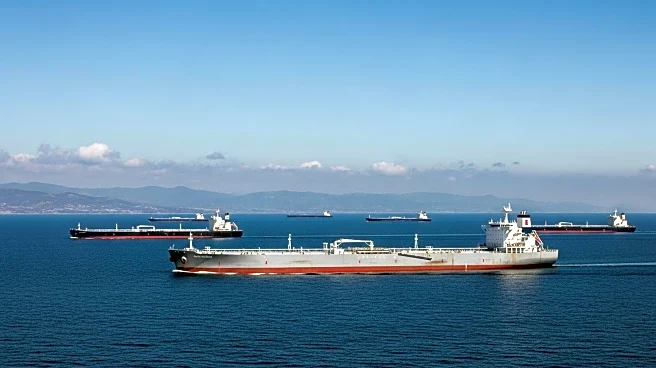What's Happening?
Iranian crude oil exports to China have seen a significant rise, with Chinese ports unloading 1.68 million barrels per day in August, marking a more than 20% increase from July. This figure surpasses the average of 1.45 million barrels per day for the first eight months of 2025, indicating a potential upward trend in Iranian oil sales to China. Despite this increase, Iran's revenue gains are limited due to falling crude prices and the need to offer discounts to Chinese buyers to mitigate the risks associated with U.S. sanctions. The sanctions, which have been expanded by the U.S., EU, and UK, target ships, shipping agents, and offload terminals involved in the Iran-China oil trade. However, these measures have proven largely ineffective, as many elements of the supply chain are either Iranian-owned or backed by Chinese companies operating within China's internal market.
Why It's Important?
The rise in Iranian oil exports to China highlights the challenges faced by international sanctions regimes in curbing trade between sanctioned nations and major global economies. The ineffectiveness of these sanctions underscores the complexities of enforcing international trade restrictions, particularly when key players are willing to circumvent them for economic gain. This situation benefits unscrupulous operators who exploit the gaps left by legitimate companies deterred by sanctions. The ongoing trade between Iran and China could potentially undermine U.S. foreign policy objectives aimed at isolating Iran economically. Additionally, the situation reflects broader geopolitical dynamics, where countries like China continue to engage with sanctioned states, potentially altering global energy markets and diplomatic relations.
What's Next?
Future developments may include potential adjustments in international sanctions strategies, such as linking breaches to tariffs, to enhance their effectiveness. However, the political will to enforce such measures remains uncertain, especially given the solidarity displayed by leaders of countries involved in the trade at recent international events. The continuation of Iranian oil exports to China could prompt further diplomatic negotiations or economic measures by the U.S. and its allies to address the ongoing trade. Additionally, the situation may lead to increased scrutiny of the entities involved in the trade and potential legal actions against those circumventing sanctions.
Beyond the Headlines
The ongoing trade between Iran and China raises ethical and legal questions about the effectiveness and fairness of international sanctions. It highlights the need for a more coordinated global approach to sanctions enforcement, considering the economic and political interests of major players like China. The situation also underscores the potential for long-term shifts in global energy markets, as countries seek alternative sources and partners to secure their energy needs amid geopolitical tensions.









